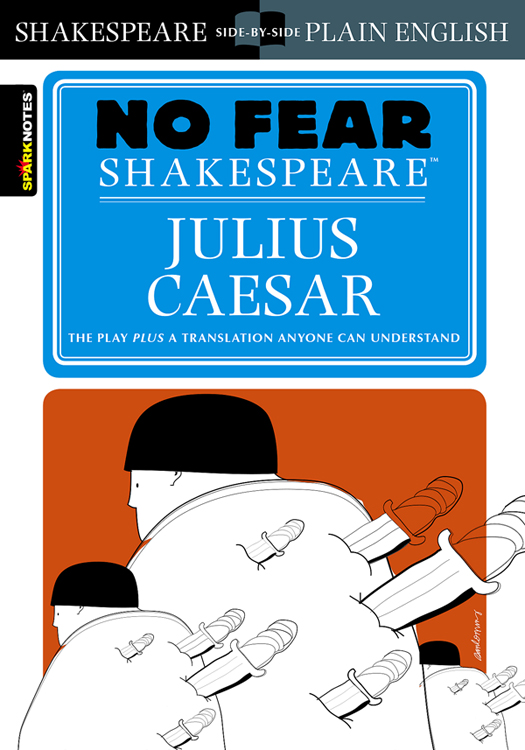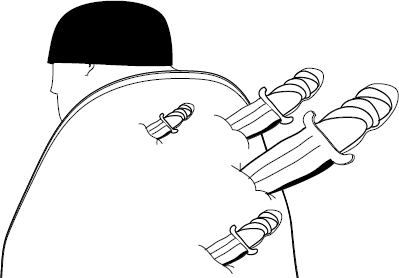As You Like It The Comedy of Errors Hamlet Henry IV, Parts One and Two Henry V Julius Caesar King Lear Macbeth The Merchant of Venice A Midsummer Nights Dream Much Ado About Nothing Othello Richard III Romeo and Juliet Sonnets The Taming of the Shrew The Tempest Twelfth Night
2003 by Spark Publishing All rights reserved. No part of this publication may be reproduced, stored in a retrieval system, or transmitted, in any form or by any means, electronic, mechanical, photocopying, recording, or otherwise, without prior written permission from the publisher. SPARKNOTES is a registered trademark of SparkNotes LLC The original text and translation for this edition was prepared by John Crowther. Spark Publishing A Division of Barnes & Noble, Inc. 120 Fifth Avenue New York, NY 10011 www.sparknotes.com ISBN: 978-1-4114-7923-4
Theres matter in these sighs, these profound heaves. (
Hamlet, 4.1.12)
FEAR
NOT.
Have you ever found yourself looking at a Shakespeare play, then down at the footnotes, then back at the play, and still not understanding? You know what the individual words mean, but they dont add up. (
Hamlet, 4.1.12)
FEAR
NOT.
Have you ever found yourself looking at a Shakespeare play, then down at the footnotes, then back at the play, and still not understanding? You know what the individual words mean, but they dont add up.
SparkNotes No Fear Shakespeare will help you break through all that. Put the pieces together with our easy-to-read translations. Soon youll be reading Shakespeares own words fearlesslyand actually enjoying it. No Fear Shakespeare pairs Shakespeares language with translations into modern Englishthe kind of English people actually speak today. When Shakespeares words make your head spin, our translations will help you sort out whats happening, whos saying what, and why.
CHARACTERS
Julius CaesarA great Roman general who has recently returned to Rome after a military victory in Spain.
Julius Caesar is not the main character of the play that bears his name; Brutus has over four times as many lines, and the play does not show us Caesars point of view. Nonetheless, virtually every other character is preoccupied with Caesarspecifically, with the possibility that Caesar may soon become king. If Caesar were to become king, it would mean the end of Romes republican system of government, in which senators, representing the citizens of Rome, wield most of the power. To noblemen like Brutus and Cassius, who consider themselves the equals of Caesar or any other citizen, Caesars coronation would mean they would no longer be free men but rather slaves. Caesar never explicitly says that he wants to be kinghe even refuses the crown three times in a dramatic public displaybut everything he says and does demonstrates that he regards himself as special and superior to other mortals. BrutusA high-ranking, well-regarded Roman nobleman who participates in a conspiracy to assassinate Caesar. BrutusA high-ranking, well-regarded Roman nobleman who participates in a conspiracy to assassinate Caesar.
Brutus is motivated by his sense of honor, which requires him to place the good of Rome above his own personal interests or feelings. Thus, he plots against Caesar in order to preserve the republic even though he loves and admires Caesar personally. While the other conspirators act out of envy and rivalry, only Brutus truly believes that Caesars death will benefit Rome. Brutuss sense of honor is also his weakness, as he tends to assume that his fellow Romans are as highminded as he is, which makes it easy for others to manipulate him. AntonyA loyal friend of Caesars. In contrast to the self-disciplined Brutus, Antony is notoriously impulsive and pleasure-seeking, passionate rather than principled.
He is extremely spontaneous and lives in the present moment. As resourceful as he is unscrupulous, Antony proves to be a dangerous enemy of Brutus and the other conspirators. CassiusA talented general and longtime acquaintance of Caesar. Cassius resents the fact that the Roman populace has come to revere Caesar almost as a god. He slyly leads Brutus to believe that Caesar has become too powerful and must die, finally converting Brutus to his cause by sending him forged letters claiming that the Roman people support the death of Caesar. Impulsive and unscrupulous like Antony, Cassius harbors no illusions about the way the political world works.
A shrewd opportunist, he acts effectively but lacks integrity. OctaviusCaesars adopted son and appointed successor. Octavius, who had been traveling abroad, returns after Caesars death, then joins with Antony and sets off to fight Cassius and Brutus. Antony tries to control Octaviuss movements, but Octavius follows his adopted fathers example and emerges as the authoritative figure, paving the way for his eventual seizure of the reins of Roman government. CascaOne of the conspirators. Casca is a tribune (an official elected to represent the common people of Rome) who resents Caesars ambition.
A rough and blunt-speaking man, Casca relates to Cassius and Brutus how Antony offered the crown to Caesar three times and how each time Caesar declined it. Casca insists, however, that Caesar was acting, manipulating the populace into believing that he has no personal ambition. Casca is the first to stab Caesar. CalphurniaCaesars wife. Calphurnia invests great authority in omens and portents. PortiaBrutuss wife and the daughter of a noble Roman (Cato) who took sides against Caesar. PortiaBrutuss wife and the daughter of a noble Roman (Cato) who took sides against Caesar.
Portia, accustomed to being Brutuss confidante, is upset to find him so reluctant to speak his mind when she finds him troubled. Flavius and MurellusTwo tribunes who condemn the plebeians for their fickleness in cheering Caesar when once they cheered for Caesars enemy Pompey. Flavius and Murellus are punished for removing the decorations from Caesars statues during Caesars triumphal parade. CiceroA Roman senator renowned for his oratorical skill. Cicero speaks at Caesars triumphal parade. LepidusThe third member of Antony and Octaviuss coalition. LepidusThe third member of Antony and Octaviuss coalition.
Though Antony has a low opinion of Lepidus, Octavius trusts Lepiduss loyalty. DeciusA member of the conspiracy. Decius convinces Caesar that Calphurnia misinterpreted her dire nightmares and that, in fact, no danger awaits him at the Senate. Decius leads Caesar right into the hands of the conspirators.














